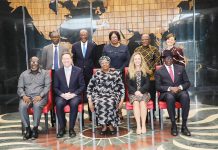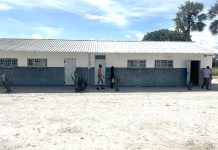Africa-Press – Namibia. INCREASINGLY this year, African oil- and gas-producing nations are being told that protecting the planet from climate change will come at the cost of their petroleum industries.
The same message is being conveyed to business: International oil companies (IOCs) have been warned by environmental organisations, financial groups, and Western leaders that investing in new exploration and production projects in Africa could result in serious repercussions, from boycotts to legal sanctions.
But even in the face of increasingly louder and more insistent calls for African countries to leave their petroleum assets stranded, African leaders are pushing back. They are citing the important roles coal, oil and gas play in their economic development, easing energy poverty and promoting long-term stability.
One of those leaders is Gwede Mantashe, minister of mineral resources and energy for South Africa, an outspoken advocate for continued natural gas production in his country. I had a front row seat to listen to Mantashe, the keynote speaker at African Energy Week (AEW) 2021 in Cape Town last week.
I am also surprised by the attacks on his speech, which I believe was a brilliant defence and call to action on developing our natural resources for the benefit of South Africans, Africans and the investors. His speech actually called for a reasoned, strategic approach to transitioning to renewable energy in his country and Africa.
Concerns about catastrophic climate change are leading to rash, and sometimes irrational calls for southern Africa to put an abrupt end to the production and use of fossil fuels, regardless of the consequences for energy security or the economy.
Southern Africa is committed to joining global efforts to address climate change, but we must move forward systematically. But instead of being guided by panic, actions must be guided by an honest assessment of South Africa’s capabilities, resources, and needs.
It would be far more advisable to take deliberate, well-planned steps toward the goal of net-zero emissions – and succeed at them – than to make a misguided rush to renewables that would do more harm than good.
Because we recognise the far-reaching benefits of foreign investment in our energy industry – including job creation, entrepreneurial opportunities, capacity building, and knowledge transfers – southern Africa has devoted considerable time and resources to creating an enabling environment for investment. We are just starting to see the fruits of these efforts.
At the African Energy Week, Mantashe did not only discuss the value of regional cooperation. He met with various ministerial delegations and the private sector and called for more action on inter-African trade and deal- making.
No one in southern Africa should miss the irony that as the global community calls for southern Africa to move its transition to renewable energy sources into overdrive, other, more developed regions grapple with similar objectives.
China, for example, has announced ambitious emissions reduction measures. Now it is struggling to meet its domestic energy needs. Chinese coal imports increased by 76% in September alone.
The government is scrambling to boost domestic coal production, and because of rising demand, coal-fired plants have been given permission to raise their electricity prices, which is sure to further affect China’s economy.
We also are acutely aware of the energy crisis in Europe, which has been caused at least in part by the rush to replace reliable energy sources like gas and coal with renewable, but intermittent, energy generation.
Now, we’re seeing European countries return to coal to generate power. I am not faulting anyone for doing what is necessary to meet their population’s energy needs; I simply wish that the global community would give southern Africa the same consideration.
Achieving zero emissions is a serious goal for all of Africa, but we must pursue it on our own timetable – and in a way that prioritises the needs of Africans.
For More News And Analysis About Namibia Follow Africa-Press






